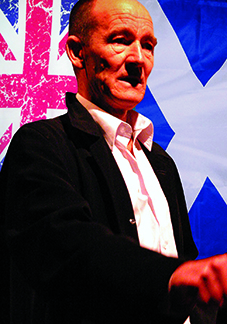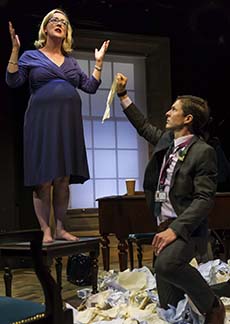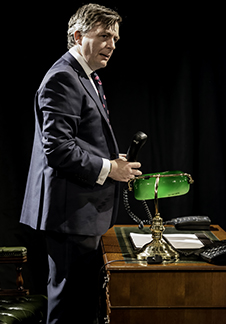By Lucy Komisar
The Edinburgh Fringe in August, the largest theater festival in the world, presents hundreds of plays as well as musicals, dance, comedy, cabaret and spoken word performances.
I chose political plays, and nine out of ten I saw were excellent. I divided them into three groups, repression, war and politics. Here‘s the third group, party politics. The parties ought to be the solution to the first two. But maybe not so much.
The plays are “The Pitiless Storm,” “Spoiling” and “Kingmaker.” The first two deal with the issue of Scottish independence from the UK which comes to a vote Sept 18th. The other, equally relevant, is about the corruption of UK Tory politics. The point made in the first two is that Scotland is progressive. Nationalist and labor members dominate the Scottish parliament. And they are almost all Scottish MPs in London. But set against the Tories, they are a minority in Westminster. So, staying in the union blocks progressive policies most Scottish voters want.
“The Pitiless Storm”
Bob Cunningham (David Hayman) is a Scottish labor leader preparing to address an audience of his comrades. He wears a gray suit and a Scottish plaid tie. A sign on the podium says “Unity (drawing of clasped hands) Strength.” But unity is sorely lacking.
He is getting an OBE – Order of the British Empire. And as he rehearses his speech, he talks to his son in the empty auditorium. In reality, this play by Chris Dolan is directed by the actor‘s son, David Hayman Jr. And Hayman‘s convictions are clear, illuminating his forceful performance. He is a man of the Scottish left.
Cunningham was a radical. He remembers a peace march he walked in at 20. He sings a line of a Spanish civil war song. He says, “We fought for internationalism.”

Now, the mood of the Labor Party has changed. He talks about how workers have been treated badly, thrown on the scrapheap. He lists his achievements, but acknowledges that he got workers education –but not jobs.
We see Cunningham struggling to defend his past and to come to grips with reality. He thinks of his wife. Ethel says: “Wasn‘t you, Bob who destroyed more industry than Thatcher. You didn‘t put a million young people on the dole. Afghanistan, Iraq, they weren‘t your wars.”
He refers to the Labor Prime Minister that took the UK into the Iraq war as “Tony criminal liar fucking Blair,” responsible for “the destruction of everything we held dear.”
And on other issues. He declares that going on a peace march against a Labor government policy in Iraq and Afghanistan would have been wrong. But he mourns that Ethel, who he adored, went marching with “the ladies” – and left him.
In his memory his son reminds him of his goals: “An end to peerages, spin, cash for honours…”
His guilt overwhelms him. He thinks that he fought for miners, shipbuilders, homeless, the unemployed. And now he thinks that was just keeping alive the yoke of empire.
He thinks, “Thank you, thank you Westminster and the Great British Commonwealth…. for fucking up my life and everything I stood for and what I thought it was to be a man. An O – B – fucking E, playing the bastards at their own game.”
Now it has come to a “tacky class war against nationalism.” He says there are “plenty of dragons still to fight in the United Kingdom. But they‘re up here as well as down there. Think of your Scottish ruling class. …We‘ve got to stand firm on this one, friends.”
It was a passionate plea to vote yes on the Sept. 18th referendum for Scottish independence from the UK.
“The Pitiless Storm.” Written by Chris Dolan; directed by David Hayman Jr.
“Spoiling”
There are piles of crumpled papers on the floor in front of a brown wood desk. Out of it pushes/rises a lady in a purple dress who is very pregnant. In “Spoiling” by John McCann, directed by Orla O‘Loughlin, Fiona (the excellent Gabriel Quigley) is the Scottish foreign minister designate who is preparing to give a major speech about the newly independent Scotland and its relationship to the UK. It‘s never said what ruling party she belongs to. You have to figure it‘s the majority Nationalists.
The date is the future, after the September 18th vote on independence which here is established as a Yes.

She has been promoted by the party, because what she said about the referendum galvanized the public.
But now the party wants to counter the vote for independence. She fears that the Scots voted for independence, but “we are indentured,” and the party leaders will finesse the vote. She doesn‘t like the speech that she‘s been given to present. It uses words like integration. .
The party is worried that she won’t stay in line, on message. They send to her office a young party hack, Mark (Richard Clements), one of those interchangeable bland-faced young men in a suit who transmits the worries of his bosses that she won‘t stick to their script. They emphasize that we can‘t embarrass our guests, the English. She is angry that the schedule has the Brits speaking first, as if they were welcoming everyone on to their house.
The crumpled papers out of which she rises are her speech. Mark picks up a paper and she reads it: “The people of Scotland did not fall for a project…” She talks about what the English did to the Scots. In passing, Mark asks who presented her with child. Turns out she was “screwed” by a Brit. [My word, but you get the idea.]
Smart and clever, it‘s what Scottish intellectuals think of the September 18th independence vote. Stay tuned.
“Spoiling.” Written by John McCann; directed by Orla O‘Loughlin. At the Traverse Theatre.
“Kingmaker”
A slick Tory MP, Max Newman (the superb Alan Cox), is plotting the moves that will make him a British prime minister. You get an idea of the corruption awaiting the Scots if they don‘t get their own country.
The chief character in this engrossing play by Robert Khan and Tom Salinsky, directed by Hannah Eidinow, is a not very disguised Boris Johnson, the Tory mayor of London, who has greater aspirations.
The dialogue reminds one of Johnson and other politicians – especially Labor prime minister Tony Blair – who are famous for public relations manipulations. One description of their ilk in the play is of “a teddy bear crossed with a serial killer.”
Now Max is in a contest for the Tory leadership, which could move him toward his quest. He‘s got some dark things in his past, affairs, he jokes “embezzlement, and I don‘t go to church.” But he quips, “The public just don‘t care.” That‘s because he looks like the rest of them, funny flawed like the rest of them, and therefore electable.

Unfortunately for Max, blocking his way is Eleanor Hopkirk (the very good Joanna Bending), an ambitious Tory MP, whose brother 20 years ago was a suicide, she says, after bullying by Max at one of England‘s prestigious universities. Is this blackmail?
She has brought along Dan Regan (Laurence Dobiesz), a meek young MP who will be part of the deal.
But Max, a former newspaper editor, is more agile than she is. Max the bully is not one to be finessed. With wide brush strokes, talk reminiscent of a gangster, he begins a pincer movement. He accuses her of seeking power through the young guy. He suggests allegations of her drinking and promiscuity. And suddenly there‘s the great PR device, a mea culpa. “This guy is our next PM, because he knows what it is to suffer.”
Yes, such manipulators are who the Brits have gotten as the PMs in both parties. Takes you back to the first plays, about why many Scots want to get out of Westminster.
“Kingmaker.” Written by Robert Khan and Tom Salinsky. Directed by Hannah Eidinow. Review also at NY Theatre Wire.

